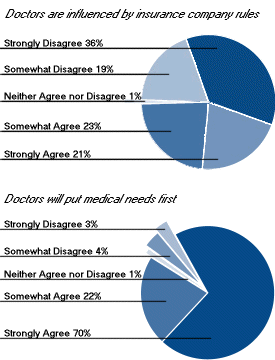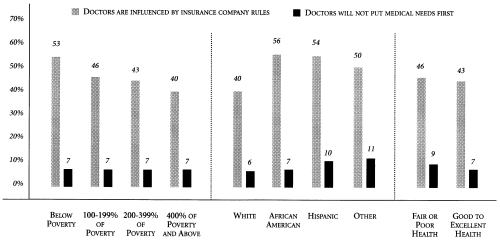
Patients Concerned About Insurer Influences
Data Bulletin No. 17
June 2000
J. Lee Hargraves
![]() egislative efforts to regulate managed
care reflect, in part, consumer concerns about how health plans influence doctor-patient
relationships. Recent findings by the Center for Studying Health System Change (HSC) show
that many consumers believe that their doctors are influenced by insurers (see Figure 1). However, they trust that their own doctor puts their
medical needs first.
egislative efforts to regulate managed
care reflect, in part, consumer concerns about how health plans influence doctor-patient
relationships. Recent findings by the Center for Studying Health System Change (HSC) show
that many consumers believe that their doctors are influenced by insurers (see Figure 1). However, they trust that their own doctor puts their
medical needs first.
Specifically, results from the 1998-1999 Community Tracking Study (CTS) Household Survey show that 44 percent of adults with public or private insurance who had a doctor visit in the past 12 months or had a doctor as a usual source of care agreed with the following statement, "I think my doctor is strongly influenced by health insurance company rules when making decisions about my medical care." This percentage remained stable between 1996-1997 and 1998-1999, a noteworthy finding given the managed care backlash.
At the same time, relatively few people, about 7 percent in the 1998-1999 survey, think that doctors fail to put patients’ needs first. Among those who felt that insurers influence their doctors, this is also true, but to a slightly higher degree (12 percent).
FIGURE 1
CONSUMERS’ TRUST IN THEIR DOCTOR

Source: Community Tracking Study Household Survey, 1998-1999
Demographic Differences
There were significant demographic differences in peoples’ perceptions that doctors may be influenced by insurance company rules, but fewer demographic differences with respect to patients’ trust that doctors put patients’ medical needs first (see Figure 2). These patterns changed little between the two surveys.
FIGURE 2
CONSUMERS’ TRUST IN THEIR DOCTOR BY INCOME, RACE AND HEALTH STATUS

Source: Community Tracking Study Household Survey, 1998-1999
Income. As income increases, there is a steady decline in the percentage of those who believe that doctors are strongly influenced by insurance company rules. For example, more than half of people with family incomes below the poverty line agree that their doctors are influenced by insurers, compared with 40 percent of those with incomes at least four times the poverty level. Across all income groups, the percentage of people who feel that doctors will not put their medical needs first in making treatment decisions was very low.
Race. African Americans and Hispanics were much more likely to agree that their doctors are influenced by insurance rules (56 percent and 54 percent, respectively), compared with whites (40 percent). In an analysis not shown here, these racial and ethnic differences remained after controlling for income and other demographic characteristics. Compared with whites and African Americans, Hispanics were more likely to believe that their doctors may not put their medical needs first when making decisions.
Health Status. People in poorer health were slightly more concerned about insurers influencing the decisions of their doctors. Although the differences were small, people who reported poorer health were more likely than those in better health to believe that doctors will not put medical needs above other considerations.
Implications
Society needs to balance the cost savings that can be achieved by influencing doctors’ decisions about referrals, tests and treatments against concerns that insurer interventions may threaten the quality of care. In part to respond to this issue, UnitedHealthcare announced it would no longer require prior approvals for care that is covered. The public has an interest in how much insurers try to influence doctors, but may be divided on whether insurers have gone too far. The challenge for policy makers is in deciding whether to intervene. These decisions require reconciling consumer concern about insurer influence with their overwhelming confidence in their doctors.
This Data Bulletin presents findings from two rounds of the Household Survey, a nationally representative telephone survey of the civilian, noninstitutionalized population conducted as part of the Community Tracking Study. The 1996-1997 survey includes nearly 33,000 families and 60,000 individuals, while the 1998-1999 survey includes about 32,000 families and 59,000 individuals. This analysis does not include people who lack health insurance. All comparisons and differences described are statistically significant at the p<.05 level.